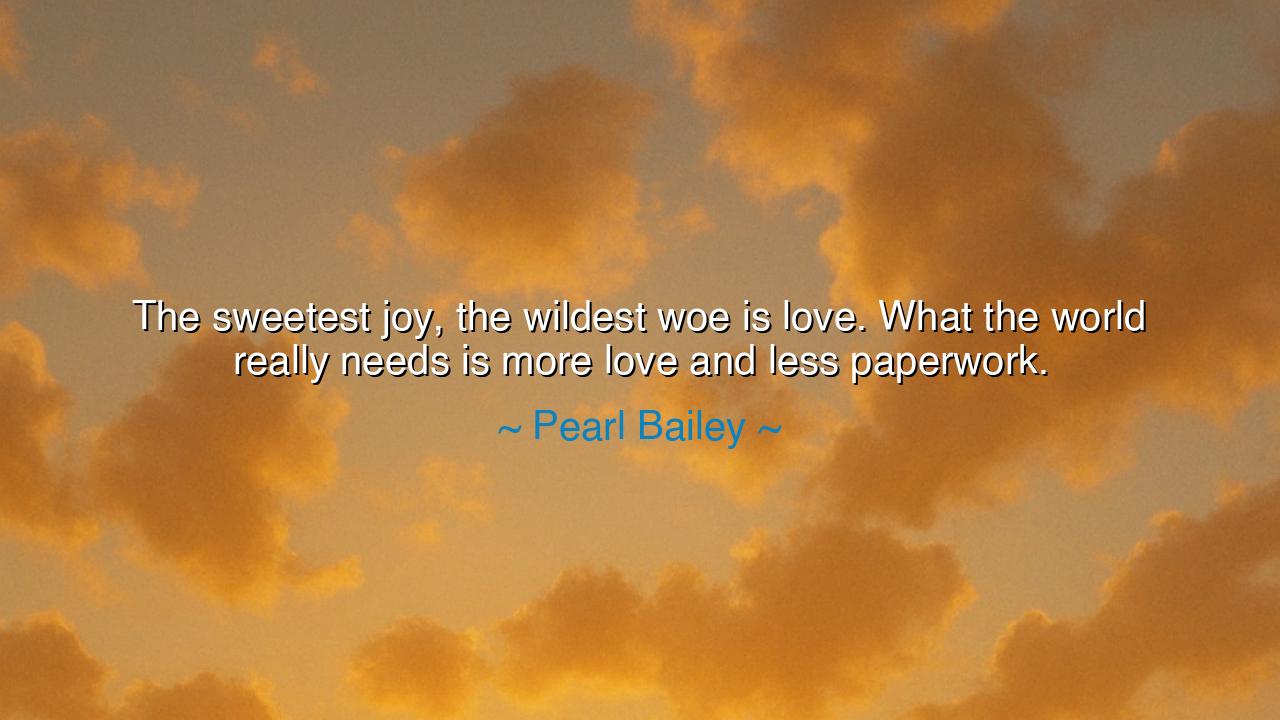
The sweetest joy, the wildest woe is love. What the world really
The sweetest joy, the wildest woe is love. What the world really needs is more love and less paperwork.






"The sweetest joy, the wildest woe is love. What the world really needs is more love and less paperwork." Thus spoke Pearl Bailey, the songstress of soul and laughter, whose voice carried not only melody but wisdom. Beneath her wit and humor, she uttered a truth that echoes across all ages: that love is both heaven and fire, both the source of our greatest delight and the wellspring of our deepest pain. And yet, she reminds us, despite its wildness and its cost, love is the one treasure that can heal the chaos of our time—a world drowning in rules, forms, and cold calculation. Her words are a call to return from the machinery of life to the beating heart that gives it meaning.
In the first half of her saying, "The sweetest joy, the wildest woe is love," Pearl Bailey captures the paradox that poets and philosophers have known since the dawn of time. Love is the divine contradiction—it lifts man to the heavens, yet it can plunge him into despair. To love is to expose one’s heart to both rapture and ruin, to walk willingly into the storm knowing it may break you. And yet, none who have truly loved would trade that experience for anything. For even in its pain, love reveals the soul’s capacity to feel, to grow, to transcend. It is both the fire that burns and the light that guides.
This dual nature of love is woven through the fabric of human history. Think of Antony and Cleopatra, whose passion defied empires and reason alike. Their love brought ecstasy and ruin, yet even in death, their bond became immortal—a tale retold for centuries. Such love, though wild and consuming, reminds us that to feel deeply is to live fully. For what is life without the pulse of love—be it for a person, a dream, a cause, or humanity itself? Without it, the world grows gray, mechanical, and lifeless, ruled not by hearts but by the sterile hand of order.
It is this lifelessness that Bailey addresses in the second half of her quote: "What the world really needs is more love and less paperwork." Though spoken with humor, her words cut deep. For in modern life, we have built towers of bureaucracy and walls of formality that suffocate the spirit. We measure human worth by numbers, assign compassion a process, and bury kindness beneath policy. We have forgotten that life is not meant to be managed—it is meant to be lived, shared, and felt. Love, she implies, is the antidote to this spiritual exhaustion. It is not found in systems or signatures but in simple acts of care—the smile to a stranger, the forgiveness of an enemy, the patience with those who falter.
Consider the story of Mother Teresa, who walked the streets of Calcutta not with papers or positions, but with love alone. Bureaucracies could not have healed the dying, nor forms brought comfort to the abandoned. Yet through her tenderness, millions found dignity and peace. She had no office, no wealth, no political power—only the greatest power of all, the willingness to love without condition. In that love, she transformed the world, proving that one heart aflame can light the path for thousands.
Bailey’s words also hold a mirror to our personal lives. How often do we hide behind the paperwork of existence—our schedules, our excuses, our distractions—avoiding the vulnerability of real connection? We seek efficiency instead of empathy, results instead of relationship. But life, as she reminds us, is not a ledger to balance; it is a song to sing, a dance to share. When we dare to love fully—to give without measure, to forgive without record—we rediscover the sweetest joy that love offers, even if it carries its wildest woe alongside it.
The lesson of Pearl Bailey’s wisdom is both gentle and profound: return to the heart. Let love be your first response, not procedure. Let compassion outrun judgment. Write fewer rules and more letters of kindness. Speak less in the language of systems and more in the language of the soul. For though paperwork may organize life, only love gives it meaning.
So, my listener, let these words guide you: embrace the sweetness and the sorrow of love, for both are sacred. And as you walk through a world crowded with noise and bureaucracy, be the one who moves through it with warmth, with laughter, and with grace. Do not let forms and formalities make you forget your humanity. For when the dust of history settles, no one will remember the paperwork—but all will remember the love that healed, the kindness that endured, and the joy that made life sing.






AAdministratorAdministrator
Welcome, honored guests. Please leave a comment, we will respond soon